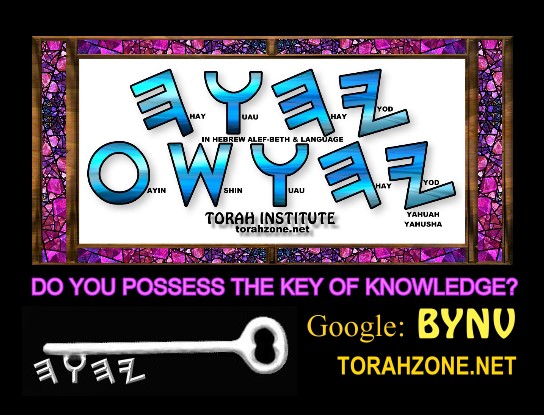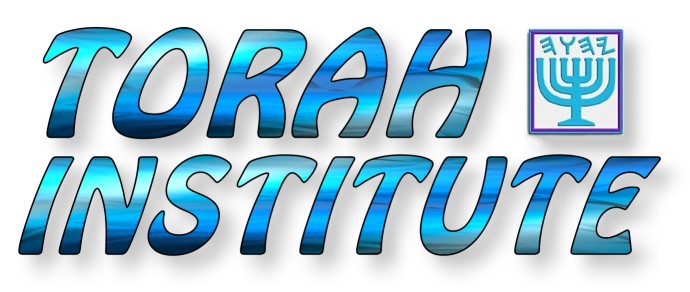CLEAN, UNCLEAN
Torah has both medical and ceremonial concerns
about touching unclean objects. The Luitical (Levite) priests were to
educate everyone, since they were the physicians and food handlers for the
chosen ones. It’s not difficult to understand, all we have to do is look
into the concept called "niddah", which involves the touching of anything
ritually unclean. You can get a quick course on this at
http://www.fossilizedcustoms.com/niddah.html
FOOD
Food is not whatever we want to eat, but that which is set apart
by the Word to be food. What Yahuah has declared to be food, and what
men have declared to be food, are two entirely separate fields, although
they intersect.
We are not even to touch the dead body of an unclean animal, so the
thought of ingesting it is out of the question.
"Proclaim the Word! Be urgent in season, out of season.
Reprove, warn, appeal, with all patience and teaching.
For there shall be a time when they shall not bear sound teaching, but
according to their own desires they shall heap up for themselves teachers
tickling the ear, and they shall indeed turn their ears away from the Truth,
and be turned aside to myths.”
– 2Timothy 4:2-4
The phrase
“according to the commands and teachings of men” (Col
2:22) influences the understanding, since we know we cannot add nor take
away from the instructions for living that Yahuah has given to us. He told
us what is food, and what to completely avoid, which include the dead
carcasses of all unclean animals. They remain unclean for eating, wearing,
or offering as slaughter-offerings. We call the instructions of men
the old wine, which due to false teachers, most have received into their
wineskin (heart).
Paul is misunderstood as we
know (2Pet 3), especially among gentiles who have no contact with wisdom
(Torah). They are kept away from Torah because their teachers have been
brain-washed with what is called dispensationalism, which
also embraces replacement
theology. To them, everything has changed; both the instructions
to live by, and the people Yahuah has selected as His treasured possession.
The food instructions will never change, yet
binding (forbidding) and loosing (permitting) is done all the time by
eisegesis - taking phrases or words out of context, and making them seem to
apply to what is already believed - making the Scripture seem to say what
they already believe. One thing that Paul had to address concerning food was
how people perceived eating food offered to idols.
THERE IS ONLY ONE
1Co 8:4-13:
"So then, concerning the eating of
food offered to
idols, we know that an idol is no
matter at all in
the world, and that there is no other Alahim
but one. For even if there are
so-called mighty ones,
whether in heaven or on earth – as there are many mighty ones and many
masters – for us there is
one Alahim, the Father, from Whom all came and for Whom we live, and on
Master Yahusha ha'Mashiak, through Whom all came and through Whom we
live.
However, not all have this
knowledge. But some, being aware of the idol,
until now eat it as having been offered to an idol, so their conscience,
being weak, is defiled.
But food does not commend us to
Alahim, for we are none the better if we eat, nor any worse for not
eating.
But look to it, lest somehow this
right of yours become a stumbling-block to those who are weak.
For if anyone sees you who
have knowledge eating in an idol’s place, shall not his conscience, if
he is weak, be built up to eat
food offered to
idols?
So this weak brother, for whom
Messiah died, shall perish through your knowledge!
Now sinning in this way against the
brothers, and wounding their weak conscience, you sin against Mashiak.
Therefore, if food makes my
brother stumble, I am never again going to eat meat, lest I make my
brother stumble."
Gnosticism is also a huge influence on this study, since “secret knowledge”
was considered necessary for anyone seeking “ascension”. Gnostics came into
the belief among the Natsarim in the latter 1st century CE. The believed all
physical matter was defiled/unclean and imperfect, and everything spiritual
was perfect. Some taught that Yahusha could not have been “in the flesh”,
but was an ephemera (apparition). These ideas came from the eastern
religions, what we call Hinduism. The concept of light/dark, good/evil,
perfect/imperfect is reflected in the “yin-yang” logo they promote. The
monks of the east were austere, and seemed to despise their own bodies for
just being alive, as this was keeping them from ascending to “Nirvana”.
Paul and Yahukanon wrote against such ideas that were in some of the minds
of their 1st century students.
The influences from eastern philosophies were
the object of what Yahukanon wrote about in these verses:
1Jn 4:2, 3: “By
this you know the Spirit of Alahim: Every spirit that confesses that Yahusha
Mashiak has come in the flesh is of Alahim, and every spirit that does not
confess that Yahusha Mashiak has come in the flesh is not of Alahim. And
this is the spirit of the anti-mashiak which you heard is coming, and now is
already in the world.”
2Jn 1:7 “Because
many who are leading astray went out into the world who do not confess Yahusha
Mashiak as coming in the flesh.
This one is
he who is leading astray and the anti-mashiak.”
Weeds Among the Wheat
As more gentiles and false
teachings entered the body of Natsarim, “multiple Christianities” grew
up like weeds under various teachers, just as Paul predicted at Acts 20:
Act 20:28-30:
“‘Therefore take heed to yourselves and to all the flock, among which the Ruach
ha’Qodesh has made you overseers, to shepherd the assembly of Alahim which
He has purchased with His own blood. For I know this, that after my
departure savage wolves shall come in among you, not sparing the flock.
Also from among
yourselves men shall arise, speaking distorted teachings, to draw away
the students after themselves.’”
Weed School
In the 1st century, the primary schools were
at Antiok and Alexandria. Alexandria dominated, and emphasized an
allegorical interpretation of Scripture, being heavily influenced
by Gnostics and Mandaeans. It was the school supported by Rome, and edicts
based on the school’s doctrines were imposed on the whole empire. The
school was known as the Didascalia, or the
Catechetical School at Alexandria. The teachings of
the “post-Nicene” Circus fathers are embraced today by a large majority of
the multiple Christianities
that exist today, and their writings are taught in seminaries.
A few of the baseline doctrines from this school
are Apostolic Succession, the Trinity, and Sun-day – these define
“Catholicism” (Latin meaning universalism). The Hindu/eastern influences are
pervasive, even to the terms embraced for their “order” (class): monks,
nuns. The shaving of the head (tonsure) is another eastern
behavioral-artifact; it certainly isn’t from our Hebrew roots.
Here are a couple of excerpts related
to Colossians in my book, where I attempt to interpret the Scriptural
understanding:
Fossilized Customs 11th
edition, page 112:
ASCETICISM:
A
severe, self-denying, austere
way of life, supposed to permit
union with the
divine— a practice condemned as
useless by Paul at Col.
2:21,22.
Pagan monks and hermits often
lived this way, most often
celibate, and they still
practice it. This was used by
Catholicism, accompanied by
“vows”, to control literate men who
copied and translated the
Scriptures. In these monk
factories, sentences from Scripture were
divided, so the men could not make
sense from them as they were
copied and translated; a “vow
of silence” was imposed so they
could not discuss what they
had worked on with others, so the
passage would remain incomplete in
their minds.
Fossilized Customs 11th
edition, pages 104, 105:
When
Paul writes at Romans 14 about “fasting” and special days, he is addressing
traditions of the
Yahudim
that arose, not Commandments. When the Temple was destroyed in 586
BCE, it became
a
custom to fast each year on the “9th of AV”. The Temple was destroyed both times on
this day.
Ferdinand and Isabella’s expulsion of the Yahudim from Spain occurred on this same
day.
At Col.
2:8, Paul says,
“See to it that no one makes you
prey through philosophy
(commentary)
and empty
deceit,
according to the traditions of men
. . .”
At Col.
2:21,22, Paul condemns
asceticism
(obsessive self-denial, austere
living) because
these
are the commands and teachings of men.
Another
place Paul’s writings are used to negate Commandments is Col. 2:11-23. If
you read the
various
translations, you will see huge
differences in the texts,
and even sentences that say the
opposite of other translations. The text says,
“Let
no one judge you . . .
FOR the body
of Mashiach.”
The KJV
shows the added word, “IS”, to the phrase,
“but the body (is) of Christ.”
At 2:16, it is
being
stressed that only the body of Mashiak should “judge” what you eat or
drink, or regarding
a
religious festival, New Moon celebration, or a Shabbat Day.
Then at
2:17, he says these things
are
shadows of things to come.
The NIV
butchered
the
text, and men over the years have read
into the text what they wanted to
see.
For more information from Scripture on food,
cleaness, and uncleaness, see:
www.fossilizedcustoms.com/foodkosher.html
TORAH INSTITUTE
POB 436044
Louisville, KY 40253-6044
phone:
502-261-9833
Google: BYNV




